Financial Management Report: Sainsbury's, Policies, and Targets
VerifiedAdded on 2021/01/03
|6
|1250
|16
Report
AI Summary
This report provides a comprehensive analysis of financial management, focusing on the application of agency theory within the context of Sainsbury's, a public limited company. It examines the role of management in meeting stakeholder objectives, highlighting the significance of agency theory in achieving financial goals such as profit maximization, revenue generation, and maintaining liquidity. The report delves into the impact of agency theory on financial decisions, including distribution channels, investment strategies, and pricing. Furthermore, it defines and discusses various financial policies, including fiscal, monetary, exchange rate, and interest rate policies, and their roles in achieving macroeconomic targets like economic growth, stability, and income equality. The conclusion emphasizes the influence of organizational performance on the economy and the positive and negative implications of agency theory, as well as the effectiveness of the discussed policies in meeting financial management objectives and macroeconomic goals. The report references key academic sources to support its analysis.
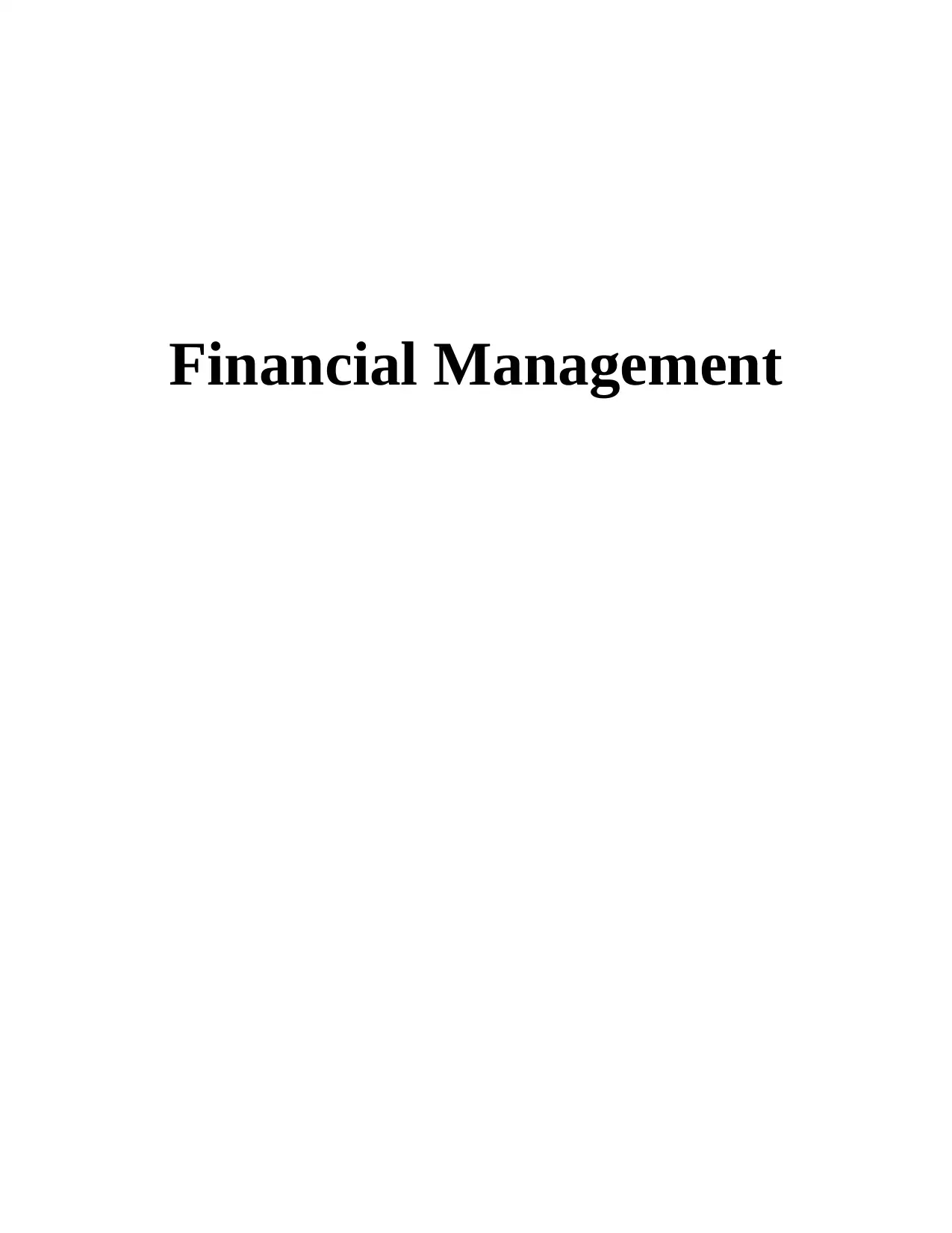
Financial Management
Paraphrase This Document
Need a fresh take? Get an instant paraphrase of this document with our AI Paraphraser
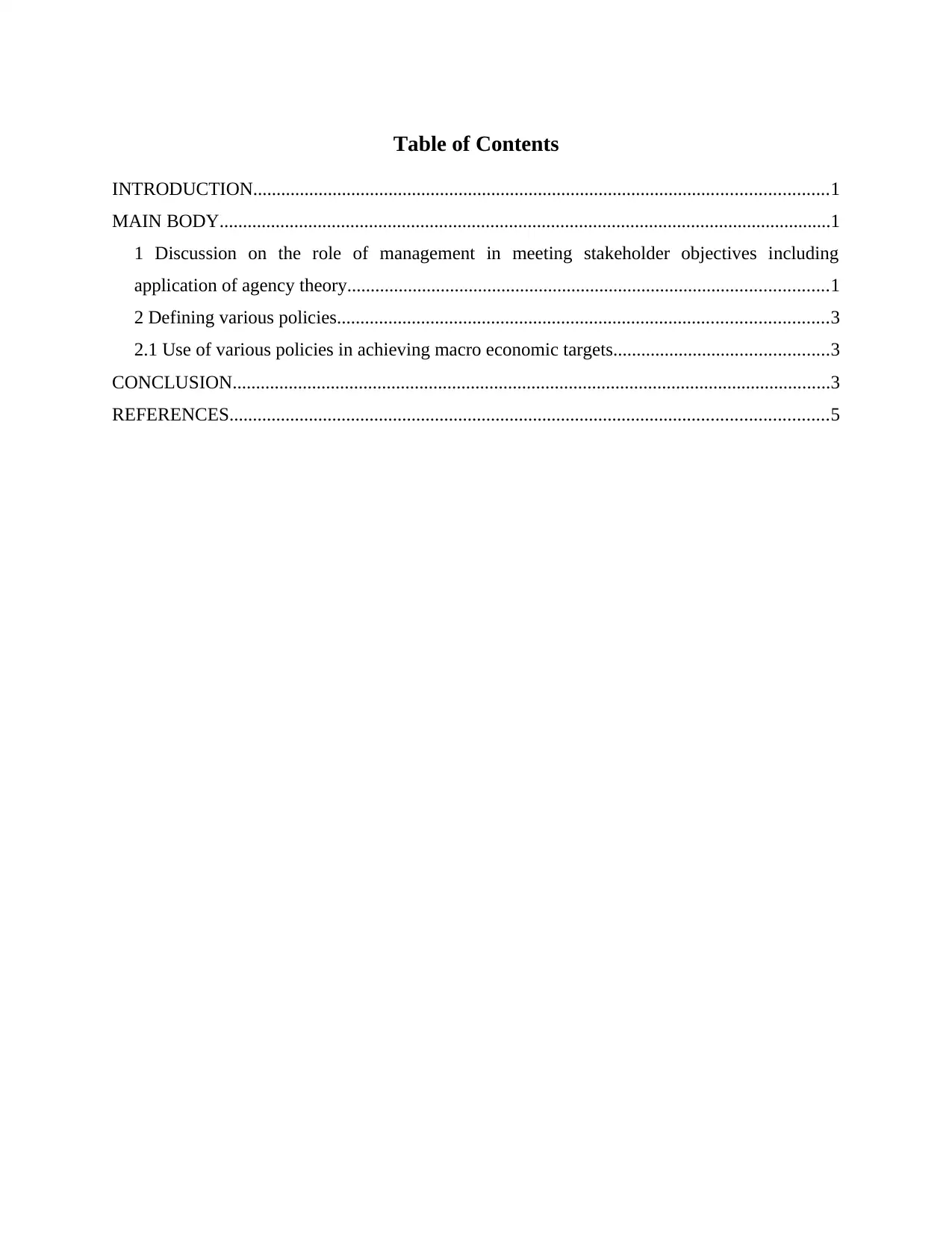
Table of Contents
INTRODUCTION...........................................................................................................................1
MAIN BODY...................................................................................................................................1
1 Discussion on the role of management in meeting stakeholder objectives including
application of agency theory.......................................................................................................1
2 Defining various policies.........................................................................................................3
2.1 Use of various policies in achieving macro economic targets..............................................3
CONCLUSION................................................................................................................................3
REFERENCES................................................................................................................................5
INTRODUCTION...........................................................................................................................1
MAIN BODY...................................................................................................................................1
1 Discussion on the role of management in meeting stakeholder objectives including
application of agency theory.......................................................................................................1
2 Defining various policies.........................................................................................................3
2.1 Use of various policies in achieving macro economic targets..............................................3
CONCLUSION................................................................................................................................3
REFERENCES................................................................................................................................5
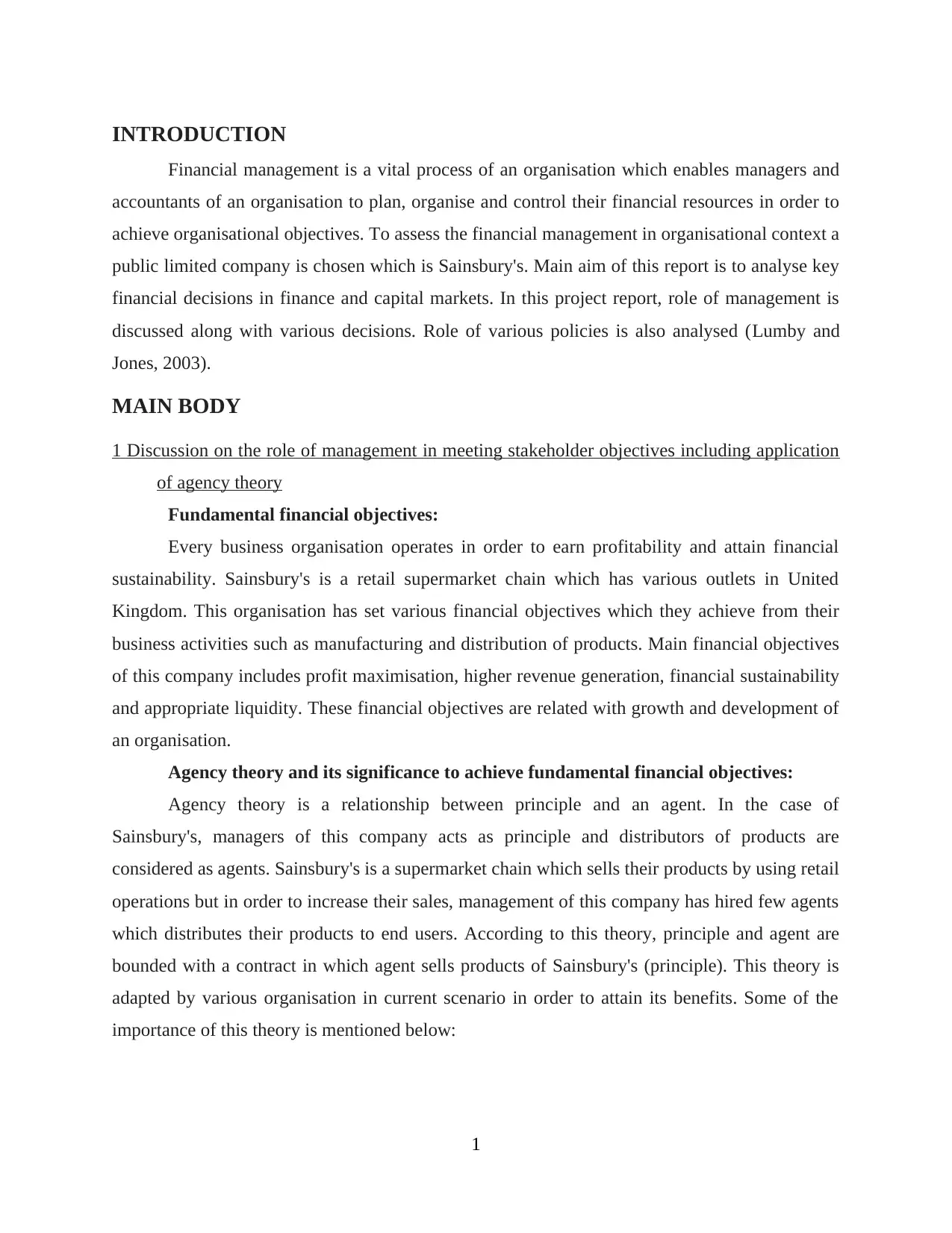
INTRODUCTION
Financial management is a vital process of an organisation which enables managers and
accountants of an organisation to plan, organise and control their financial resources in order to
achieve organisational objectives. To assess the financial management in organisational context a
public limited company is chosen which is Sainsbury's. Main aim of this report is to analyse key
financial decisions in finance and capital markets. In this project report, role of management is
discussed along with various decisions. Role of various policies is also analysed (Lumby and
Jones, 2003).
MAIN BODY
1 Discussion on the role of management in meeting stakeholder objectives including application
of agency theory
Fundamental financial objectives:
Every business organisation operates in order to earn profitability and attain financial
sustainability. Sainsbury's is a retail supermarket chain which has various outlets in United
Kingdom. This organisation has set various financial objectives which they achieve from their
business activities such as manufacturing and distribution of products. Main financial objectives
of this company includes profit maximisation, higher revenue generation, financial sustainability
and appropriate liquidity. These financial objectives are related with growth and development of
an organisation.
Agency theory and its significance to achieve fundamental financial objectives:
Agency theory is a relationship between principle and an agent. In the case of
Sainsbury's, managers of this company acts as principle and distributors of products are
considered as agents. Sainsbury's is a supermarket chain which sells their products by using retail
operations but in order to increase their sales, management of this company has hired few agents
which distributes their products to end users. According to this theory, principle and agent are
bounded with a contract in which agent sells products of Sainsbury's (principle). This theory is
adapted by various organisation in current scenario in order to attain its benefits. Some of the
importance of this theory is mentioned below:
1
Financial management is a vital process of an organisation which enables managers and
accountants of an organisation to plan, organise and control their financial resources in order to
achieve organisational objectives. To assess the financial management in organisational context a
public limited company is chosen which is Sainsbury's. Main aim of this report is to analyse key
financial decisions in finance and capital markets. In this project report, role of management is
discussed along with various decisions. Role of various policies is also analysed (Lumby and
Jones, 2003).
MAIN BODY
1 Discussion on the role of management in meeting stakeholder objectives including application
of agency theory
Fundamental financial objectives:
Every business organisation operates in order to earn profitability and attain financial
sustainability. Sainsbury's is a retail supermarket chain which has various outlets in United
Kingdom. This organisation has set various financial objectives which they achieve from their
business activities such as manufacturing and distribution of products. Main financial objectives
of this company includes profit maximisation, higher revenue generation, financial sustainability
and appropriate liquidity. These financial objectives are related with growth and development of
an organisation.
Agency theory and its significance to achieve fundamental financial objectives:
Agency theory is a relationship between principle and an agent. In the case of
Sainsbury's, managers of this company acts as principle and distributors of products are
considered as agents. Sainsbury's is a supermarket chain which sells their products by using retail
operations but in order to increase their sales, management of this company has hired few agents
which distributes their products to end users. According to this theory, principle and agent are
bounded with a contract in which agent sells products of Sainsbury's (principle). This theory is
adapted by various organisation in current scenario in order to attain its benefits. Some of the
importance of this theory is mentioned below:
1
⊘ This is a preview!⊘
Do you want full access?
Subscribe today to unlock all pages.

Trusted by 1+ million students worldwide
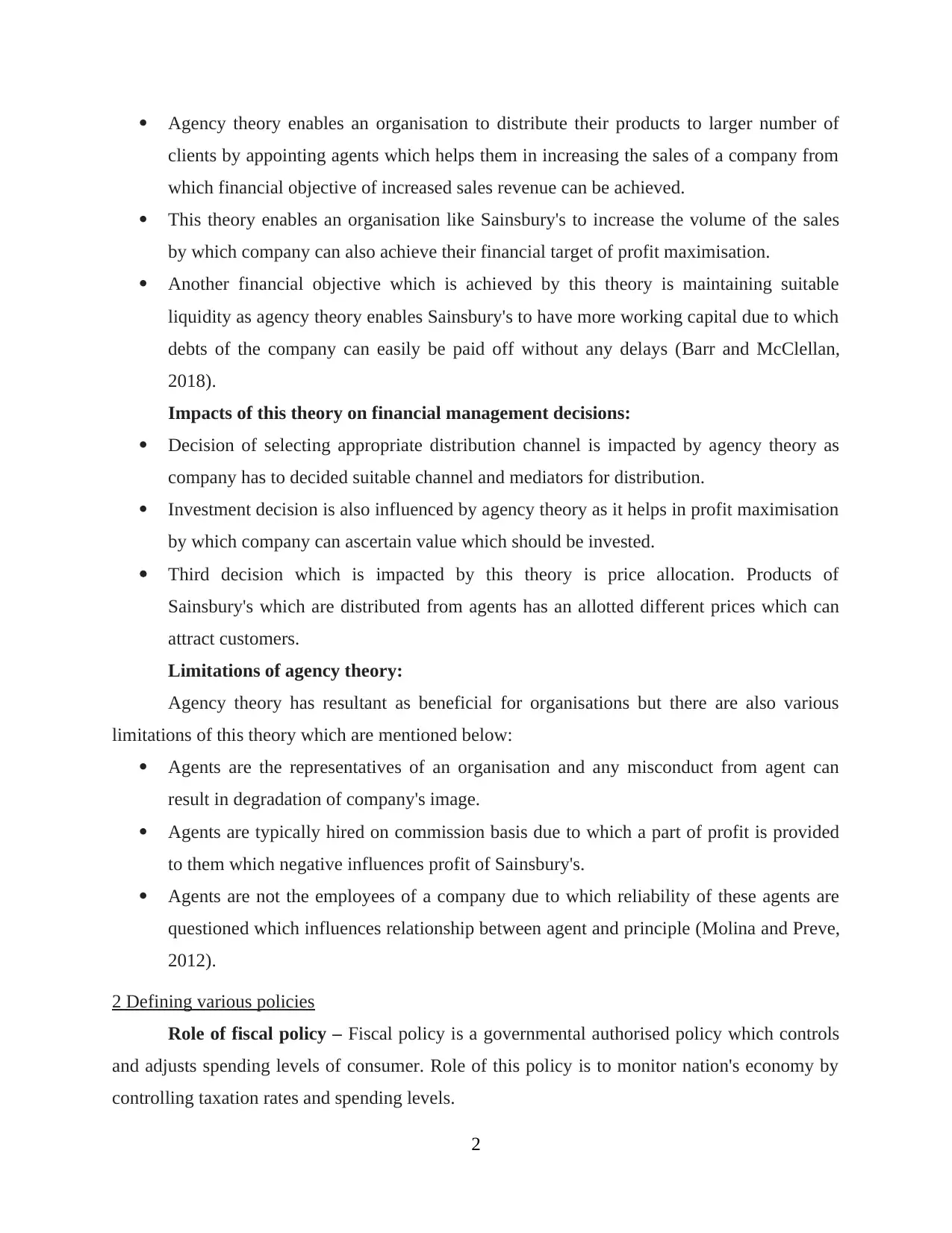
Agency theory enables an organisation to distribute their products to larger number of
clients by appointing agents which helps them in increasing the sales of a company from
which financial objective of increased sales revenue can be achieved.
This theory enables an organisation like Sainsbury's to increase the volume of the sales
by which company can also achieve their financial target of profit maximisation.
Another financial objective which is achieved by this theory is maintaining suitable
liquidity as agency theory enables Sainsbury's to have more working capital due to which
debts of the company can easily be paid off without any delays (Barr and McClellan,
2018).
Impacts of this theory on financial management decisions:
Decision of selecting appropriate distribution channel is impacted by agency theory as
company has to decided suitable channel and mediators for distribution.
Investment decision is also influenced by agency theory as it helps in profit maximisation
by which company can ascertain value which should be invested.
Third decision which is impacted by this theory is price allocation. Products of
Sainsbury's which are distributed from agents has an allotted different prices which can
attract customers.
Limitations of agency theory:
Agency theory has resultant as beneficial for organisations but there are also various
limitations of this theory which are mentioned below:
Agents are the representatives of an organisation and any misconduct from agent can
result in degradation of company's image.
Agents are typically hired on commission basis due to which a part of profit is provided
to them which negative influences profit of Sainsbury's.
Agents are not the employees of a company due to which reliability of these agents are
questioned which influences relationship between agent and principle (Molina and Preve,
2012).
2 Defining various policies
Role of fiscal policy – Fiscal policy is a governmental authorised policy which controls
and adjusts spending levels of consumer. Role of this policy is to monitor nation's economy by
controlling taxation rates and spending levels.
2
clients by appointing agents which helps them in increasing the sales of a company from
which financial objective of increased sales revenue can be achieved.
This theory enables an organisation like Sainsbury's to increase the volume of the sales
by which company can also achieve their financial target of profit maximisation.
Another financial objective which is achieved by this theory is maintaining suitable
liquidity as agency theory enables Sainsbury's to have more working capital due to which
debts of the company can easily be paid off without any delays (Barr and McClellan,
2018).
Impacts of this theory on financial management decisions:
Decision of selecting appropriate distribution channel is impacted by agency theory as
company has to decided suitable channel and mediators for distribution.
Investment decision is also influenced by agency theory as it helps in profit maximisation
by which company can ascertain value which should be invested.
Third decision which is impacted by this theory is price allocation. Products of
Sainsbury's which are distributed from agents has an allotted different prices which can
attract customers.
Limitations of agency theory:
Agency theory has resultant as beneficial for organisations but there are also various
limitations of this theory which are mentioned below:
Agents are the representatives of an organisation and any misconduct from agent can
result in degradation of company's image.
Agents are typically hired on commission basis due to which a part of profit is provided
to them which negative influences profit of Sainsbury's.
Agents are not the employees of a company due to which reliability of these agents are
questioned which influences relationship between agent and principle (Molina and Preve,
2012).
2 Defining various policies
Role of fiscal policy – Fiscal policy is a governmental authorised policy which controls
and adjusts spending levels of consumer. Role of this policy is to monitor nation's economy by
controlling taxation rates and spending levels.
2
Paraphrase This Document
Need a fresh take? Get an instant paraphrase of this document with our AI Paraphraser
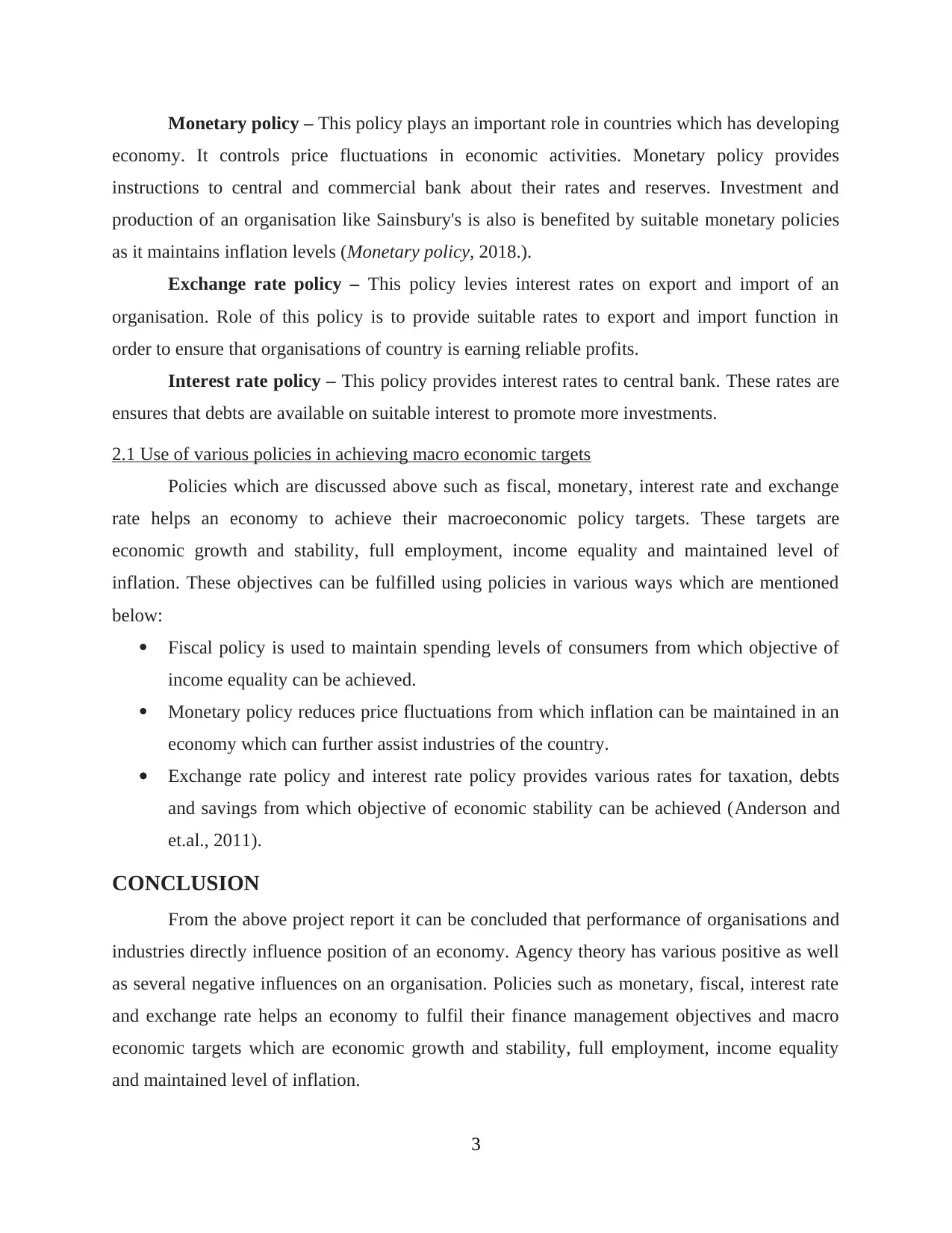
Monetary policy – This policy plays an important role in countries which has developing
economy. It controls price fluctuations in economic activities. Monetary policy provides
instructions to central and commercial bank about their rates and reserves. Investment and
production of an organisation like Sainsbury's is also is benefited by suitable monetary policies
as it maintains inflation levels (Monetary policy, 2018.).
Exchange rate policy – This policy levies interest rates on export and import of an
organisation. Role of this policy is to provide suitable rates to export and import function in
order to ensure that organisations of country is earning reliable profits.
Interest rate policy – This policy provides interest rates to central bank. These rates are
ensures that debts are available on suitable interest to promote more investments.
2.1 Use of various policies in achieving macro economic targets
Policies which are discussed above such as fiscal, monetary, interest rate and exchange
rate helps an economy to achieve their macroeconomic policy targets. These targets are
economic growth and stability, full employment, income equality and maintained level of
inflation. These objectives can be fulfilled using policies in various ways which are mentioned
below:
Fiscal policy is used to maintain spending levels of consumers from which objective of
income equality can be achieved.
Monetary policy reduces price fluctuations from which inflation can be maintained in an
economy which can further assist industries of the country.
Exchange rate policy and interest rate policy provides various rates for taxation, debts
and savings from which objective of economic stability can be achieved (Anderson and
et.al., 2011).
CONCLUSION
From the above project report it can be concluded that performance of organisations and
industries directly influence position of an economy. Agency theory has various positive as well
as several negative influences on an organisation. Policies such as monetary, fiscal, interest rate
and exchange rate helps an economy to fulfil their finance management objectives and macro
economic targets which are economic growth and stability, full employment, income equality
and maintained level of inflation.
3
economy. It controls price fluctuations in economic activities. Monetary policy provides
instructions to central and commercial bank about their rates and reserves. Investment and
production of an organisation like Sainsbury's is also is benefited by suitable monetary policies
as it maintains inflation levels (Monetary policy, 2018.).
Exchange rate policy – This policy levies interest rates on export and import of an
organisation. Role of this policy is to provide suitable rates to export and import function in
order to ensure that organisations of country is earning reliable profits.
Interest rate policy – This policy provides interest rates to central bank. These rates are
ensures that debts are available on suitable interest to promote more investments.
2.1 Use of various policies in achieving macro economic targets
Policies which are discussed above such as fiscal, monetary, interest rate and exchange
rate helps an economy to achieve their macroeconomic policy targets. These targets are
economic growth and stability, full employment, income equality and maintained level of
inflation. These objectives can be fulfilled using policies in various ways which are mentioned
below:
Fiscal policy is used to maintain spending levels of consumers from which objective of
income equality can be achieved.
Monetary policy reduces price fluctuations from which inflation can be maintained in an
economy which can further assist industries of the country.
Exchange rate policy and interest rate policy provides various rates for taxation, debts
and savings from which objective of economic stability can be achieved (Anderson and
et.al., 2011).
CONCLUSION
From the above project report it can be concluded that performance of organisations and
industries directly influence position of an economy. Agency theory has various positive as well
as several negative influences on an organisation. Policies such as monetary, fiscal, interest rate
and exchange rate helps an economy to fulfil their finance management objectives and macro
economic targets which are economic growth and stability, full employment, income equality
and maintained level of inflation.
3
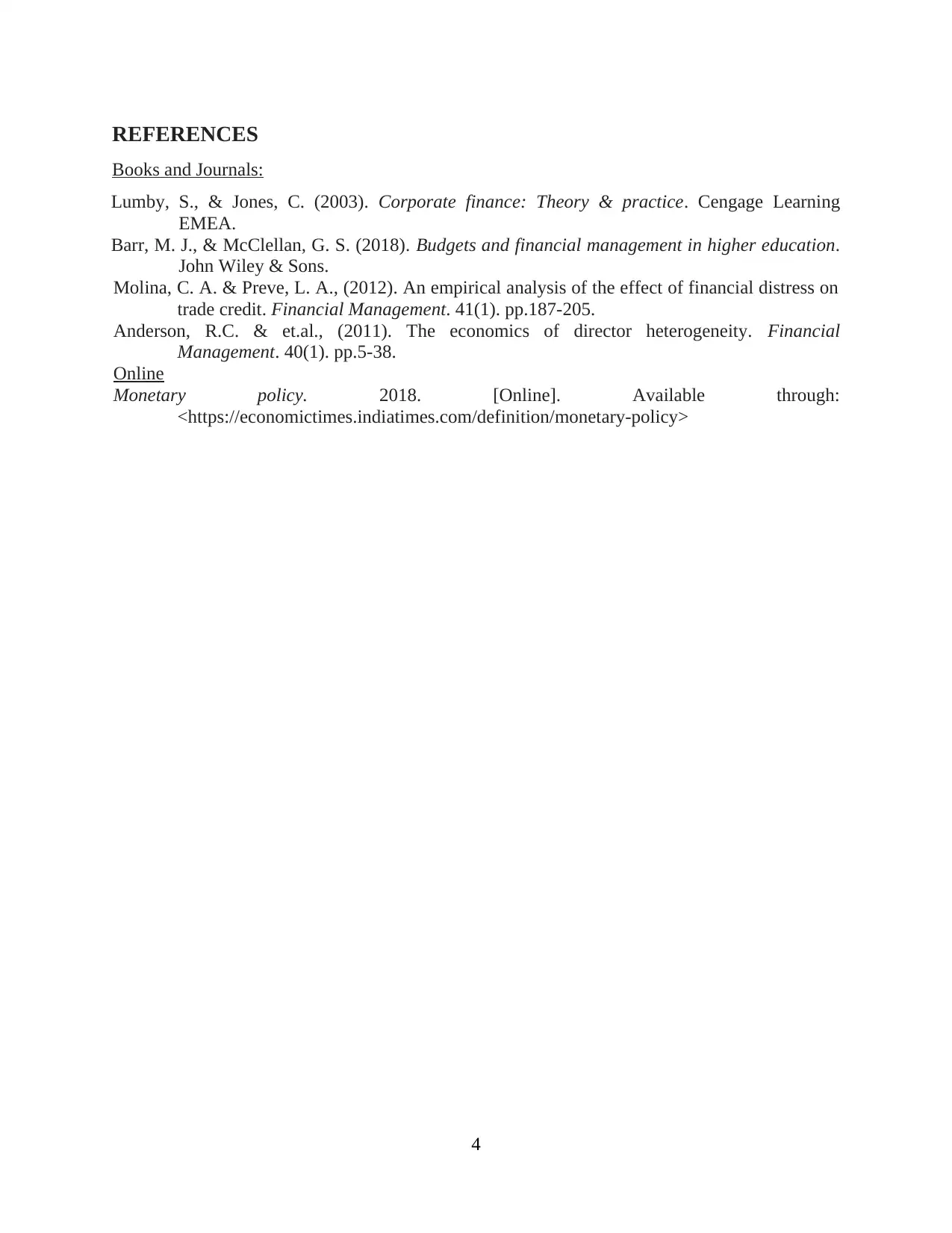
REFERENCES
Books and Journals:
Lumby, S., & Jones, C. (2003). Corporate finance: Theory & practice. Cengage Learning
EMEA.
Barr, M. J., & McClellan, G. S. (2018). Budgets and financial management in higher education.
John Wiley & Sons.
Molina, C. A. & Preve, L. A., (2012). An empirical analysis of the effect of financial distress on
trade credit. Financial Management. 41(1). pp.187-205.
Anderson, R.C. & et.al., (2011). The economics of director heterogeneity. Financial
Management. 40(1). pp.5-38.
Online
Monetary policy. 2018. [Online]. Available through:
<https://economictimes.indiatimes.com/definition/monetary-policy>
4
Books and Journals:
Lumby, S., & Jones, C. (2003). Corporate finance: Theory & practice. Cengage Learning
EMEA.
Barr, M. J., & McClellan, G. S. (2018). Budgets and financial management in higher education.
John Wiley & Sons.
Molina, C. A. & Preve, L. A., (2012). An empirical analysis of the effect of financial distress on
trade credit. Financial Management. 41(1). pp.187-205.
Anderson, R.C. & et.al., (2011). The economics of director heterogeneity. Financial
Management. 40(1). pp.5-38.
Online
Monetary policy. 2018. [Online]. Available through:
<https://economictimes.indiatimes.com/definition/monetary-policy>
4
⊘ This is a preview!⊘
Do you want full access?
Subscribe today to unlock all pages.

Trusted by 1+ million students worldwide
1 out of 6
Related Documents
Your All-in-One AI-Powered Toolkit for Academic Success.
+13062052269
info@desklib.com
Available 24*7 on WhatsApp / Email
![[object Object]](/_next/static/media/star-bottom.7253800d.svg)
Unlock your academic potential
Copyright © 2020–2025 A2Z Services. All Rights Reserved. Developed and managed by ZUCOL.





